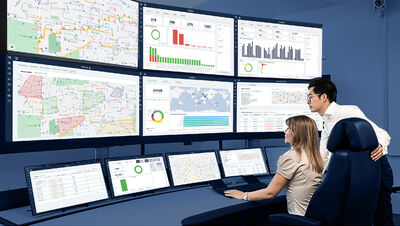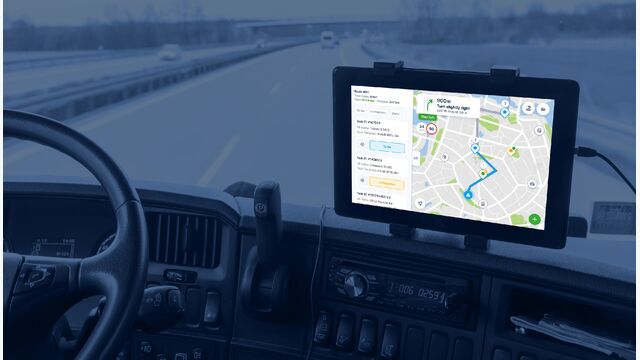Smart Waste Management : "Smart waste management promotes recycling and reduces operational costs"

Evreka's CEO Umutcan Duman
- © EvrekaCan you explain the concept of data-driven waste management technology and how it differs from traditional approaches?
Traditional methods are no longer effective in the rapidly evolving waste and resource management industry. Using old-school methods can result in inefficiencies, errors, and higher costs in the age of cutting-edge technologies. Data-driven waste management technology represents a transformative shift from traditional approaches by combining the power of data and advanced analytics. Unlike traditional methods, it uses real-time data from various sources like sensors, GPS devices, and mobile apps to monitor waste collection, disposal, and recycling processes. This technology ensures data accuracy and reliability, which not only enhances efficiency but also reduces costs and minimizes environmental impact. As a result, data-driven waste management technology facilitates a cost-effective, sustainable approach, ideal for waste management companies, municipalities, recycling companies, and waste producers.
What types of data are typically collected in data-driven waste management systems, and how is this data used to make informed decisions?
Data-driven waste management systems, such as our comprehensive solution Evreka360, collect diverse information, including bin fill levels, collection routes, and asset details. This data is about the answers for when, how long, where, and who kind of waste collection operations. During the planning phase, these data are presented to operations managers to plan/schedule the most effective waste collection/city cleaning services while keeping up with SLAs. With the informed decisions in hand, it becomes much easier to optimize their operations and resource allocation, minimize environmental impact, and generate new revenue. We saw 10 per cent fuel expenditure reductions and a 24 per cent increase in task completion while serving with fewer waste trucks with our clients due to data-driven waste management. Additionally, data-driven insights enable proactive maintenance, enhancing overall system performance.
Stay connected - subscribe to our newsletters!

What challenges are associated with managing and analyzing large volumes of data generated by data-driven waste management systems?
One significant challenge is handling and analyzing the vast volume of data generated. Efficient data storage, processing, and real-time analysis require comprehensive, fully automated, customizable and easy-to-use systems.
If we look at Evreka’s solutions, it addresses this challenge with its end-to-end, easy-to-use, comprehensive design that covers every aspect of waste management, from waste generation to waste disposal or repurposing. This holistic approach ensures that our users can trust us to handle any waste material or resource operation they may have. Whether it's hazardous waste, municipal solid waste, or manufacturing waste, our solution can handle it all. Moreover, we simplify the process for our users by providing a single source for all waste management needs, eliminating the need to work with multiple vendors. This saves our users valuable time and resources and enables us to better understand their specific waste management requirements, allowing us to provide tailored solutions.
Our flexible and fully customizable solution allows customers to adapt our service to their precise needs. From modifying the user interface to incorporating new features or integrations, customization possibilities abound. We work closely with each customer to comprehend their unique requirements. Flexibility is further enhanced by our solution's seamless integration capabilities with any IT infrastructure, either as a standalone solution or part of a larger ecosystem. This ensures a smooth integration process without necessitating costly or time-consuming upgrades.
Our user-friendly interface helps users rapidly and easily access the information they need to make informed decisions about their waste management operations. We also eliminate errors caused due to manual work via our end-to-end digitized processes, allowing us to offer our users faster, more efficient, and more accurate services. All data is collected and stored digitally, ensuring zero-paper operations.
What steps are typically taken to ensure the data collected and analyzed in waste management processes is reliable and relevant?
An end-to-end digital platform is crucial to ensure data collected and analyzed in waste management processes is reliable and relevant. In the case of Evreka, we provide a fully automated system for every aspect of the waste management process, from collection and transportation to processing and disposal. This process starts at the design phase of the projects with data flow and data collection planning, why we are collecting such data, where it will be used, and how we can be confident (data quality assurance, data standardisation, data security, and privacy ) about the reliability of the data kind of questions are answered at this stage. We then establish a secure data storage system with backups to prevent data loss and organise them in a structured manner for easy retrieval and analysis. Then comes the interpretation of the data; our data science team selects/tests appropriate data analysis techniques to be used. The rest is a classic product development process with feedback loops. This comprehensive approach minimizes manual data entry, reducing the risk of human error and ensuring data accuracy.
Furthermore, our real-time data analytics continuously monitor the entire waste management operation. Any anomalies or inefficiencies are immediately flagged, enabling prompt corrective actions. This in turn, not only enhances faster response times and higher accuracy in data but also contributes to improved management of waste streams.
Related article: "Deep learning enables the sorting of new materials"
An end-to-end digital platform is crucial to ensure data collected and analyzed in waste management processes is reliable and relevant.
Are there any regulatory or compliance aspects that must be considered when implementing data-driven waste management technologies, especially when dealing with sensitive waste data?
When implementing data-driven waste management technologies, especially when dealing with sensitive waste data, it is important to consider various local and regional waste management laws and regulations. Firstly, strict adherence to data privacy regulations like the European Union's GDPR or local data protection laws such as the California Consumer Privacy Act (CCPA) in the United States is essential. Some countries also require personal/financial data to be stored in their country.
Sensitive waste data requires proper encryption and access controls to safeguard information, especially when shared with third parties. Companies must obtain explicit data collection and processing consent, implement robust data security measures, and ensure compliance with data retention and deletion policies. Additionally, transparency in communicating data usage to stakeholders and providing data access and correction options is vital. Organizations must be prepared to provide compliance reports and documentation to regulatory bodies, demonstrating how data is managed in accordance with legal requirements. Regular updates on evolving regulations and employee training also contribute to implementing a data-driven waste management system.
More on the topic: The Future of Recycling: Robots on the Rise
What role do data privacy and security play in implementing smart waste management technologies?
Data privacy and security are foundational elements in successfully implementing smart waste management technologies. At Evreka, we prioritize these aspects with a cloud-based system at the core. When implementing our solutions, we select and implement the necessary hardware and software integrations. We select secure and reliable vendors for hardware and software integrations to ensure a high level of privacy for the whole waste management system. This ensures data is securely stored within a robust Software as a Service (SaaS) framework. Moreover, we are fully compliant with the European Union's General Data Protection Regulation (EU GDPR), which ensures data protection standards. By prioritizing transparency in our data privacy and security policies, we assure users that their data is handled with care and integrity. Data privacy and security are central to building trust and enabling the effective deployment of smart waste management solutions.
Read more on this topic in our previous business talks here and here!

What are some of the potential environmental and economic benefits of implementing smart waste management systems in urban areas?
Implementing smart waste management systems brings substantial environmental and economic benefits. It reduces unnecessary emissions, minimizes landfill waste, and promotes recycling. This, in turn, reduces operational costs, decreases carbon footprints, and supports a sustainable urban environment.
Smart waste management also promotes recycling and repurposing of waste materials, which is vital for conserving valuable resources. Recycling reduces the strain on natural resources and creates new work areas in the recycling and waste processing sectors, leading to new employment opportunities and innovative waste reduction technologies.
Another noteworthy economic benefit of smart waste management for urban areas is reducing operational costs for municipalities and waste management companies. Smart waste management enables them to optimize resource allocation, leading to more cost-efficient operations. By minimizing the need for landfill disposal and focusing on recycling, these systems reduce the long-term financial burden and negative environmental impact associated with landfills.
Like our content? Subscribe to our newsletters!
Smart waste management also promotes recycling and repurposing of waste materials, which is vital for conserving valuable resources.
What role does the Internet of Things (IoT) play in connecting various elements of waste management, such as waste bins, collection vehicles, and central monitoring systems?
IoT plays a critical role in connecting waste management elements. Smart bins, collection vehicles, and central monitoring systems communicate seamlessly through IoT devices. This connectivity ensures real-time data flow, allowing for dynamic collection route and schedule adjustments. It ensures timely collections, minimizes fuel consumption and reduces emissions. In the case of Evreka’s solutions, IoT also offers organizations the insights and tools they need to reduce carbon emissions, conserve resources, and create closed-loop systems.
What advice would you give to municipalities or waste management companies that are considering transitioning to a smart waste management approach?
When contemplating the transition to a smart waste management approach, municipalities and waste management companies should go beyond just the technological aspect and consider a holistic strategy. Defining clear objectives and key performance indicators (KPIs) that align with the organization's goals is important. These KPIs can include metrics like reducing operational costs, decreasing customer complaints, increasing operational efficiency, and minimizing environmental impact. To ensure these KPIs, selecting the right technology partners is equally important. Collaborating with solution providers with in-depth sectoral experience and can apply their know-how to tailor solutions to their specific needs would ensure they have the necessary support and expertise throughout the transition. By adopting a strategic and comprehensive approach, municipalities and waste management companies can enhance their operational efficiency and mitigate issues related to unreliable data due to manual errors. This transition paves the way for a more sustainable and efficient waste management future.
Related article: Digital solutions help make waste management more efficient
How do you foresee data-driven waste management technologies evolving in the future, and what new possibilities do you see on the horizon?
The future of data-driven waste management technologies holds exciting possibilities. IoT sensors and AI-driven algorithms transform waste collection with real-time monitoring and intelligent route optimization, reducing costs and environmental impact. Advanced robotics and AI-powered sorting systems are increasing the efficiency and accuracy of waste sorting at recycling facilities, leading to higher recycling rates. Moreover, data-driven technologies facilitate the shift towards a circular economy by enabling comprehensive tracking of materials throughout their lifecycle, supporting recycling, remanufacturing, and reuse initiatives. Consumer engagement apps are also on the rise, empowering individuals to actively participate in waste reduction and recycling through gamification and rewards. These innovations represent just a glimpse of the promising future of data-driven waste management, where sustainability, efficiency, and environmental responsibility take centre stage.


